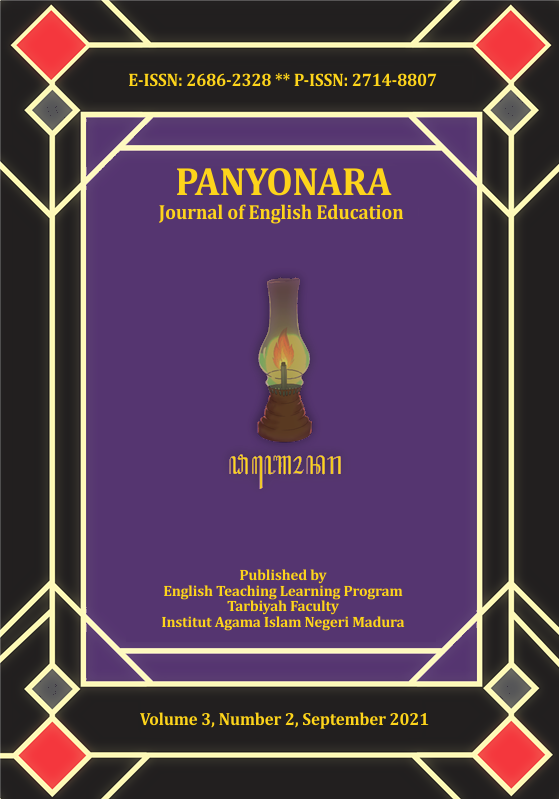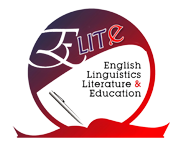Exploring the EFL Students’ Reading Strategies Used on Reading Academic Articles
 Abstract views: 823
,
Abstract views: 823
,
 PDF downloads: 668
PDF downloads: 668
Abstract
Reading activity is one of the essential skills for English language learners. Therefore, the use of reading strategies as one of the reading process rules should be considered. In considering the importance of reading strategies, this present study is intended to explore the reading strategies utilized by third-year EFL students on reading academic articles. To answer the research question, writers adopted the reading strategies questionnaire proposed by Oxford (1990). There were 21 statements and 31 samples involved in this present study. The significance of this study showed that meta-cognitive techniques were most frequently used by the students, followed by cognitive and affective, and then the less frequently used is social strategies. According to this finding, reading strategies should be noticed and taken as one of the considerations by lecturers and students to improve the EFL students’ comprehension of reading academic articles.
Downloads
References
Aisah, N., Surtiana, R, L., & Nurjamin. (2021). Metacognitive Strategies in Student’s Reading Comprehension. English Education and Applied Linguistics (EEAL) Journal 20, 4(1), 20–29.
Asmara, N. I. (2017). An Analysis of Cognitive Reading Strategies Used in Reading Comprehension. Conaplin 82(9), 304–307. https://doi.org/10.2991/conaplin-16.2017.69
Chen, K. T. C., & Chen, S. C. L. (2015). The Use of EFL Reading Strategies Among High School Students in Taiwan. The Reading Matrix: An International Online Journal, 15(2), 156–166.
Durbin, C. G. (2009). How to Read A Scientific Research Paper. Respiratory Care, 54(10), 1366–1371.
Etxebarria, A., Garay, U., & Romero, A. (2012). Implementation of Social Strategies in Language Learning by Means of Moodle. Journal of Language Teaching and Research, 3(2). https://doi.org/10.4304/jltr.3.2.273-282
Hancock, B. (2006). An Introduction to Qualitative Research Authors. Qualitative Research, 4th, 504. https://doi.org/10.1109/TVCG.2007.70541
Hung, D. M., & Phan Thu Ngan, V. (2015). Investigating Reading Strategies Used by EFL Students at Dong Thap University. Asian Journal of Educational Research 3(4), 10–20.
Jonathan Aliponga. (2013). Reading Journal : Its Benefits for Extensive Reading Extensive Reading. International Journal of Humanities and Social Science, 3(Humanities and Behavioral Science), 73–80.
Karbalaei, A. (2010). A Comparison of the Metacognitive Reading Strategies Used by EFL and ESL Readers. The Reading Matrix, 10(2), 165–180. http://www.readingmatrix.com/articles/sept_2010/alireza_karbalaei.pdf
Kazemi, M., Hosseini, M., & Kohandani, M. (2013). Strategic Reading Instruction in EFL Contexts. Theory and Practice in Language Studies, 3(12), 2333–2342. https://doi.org/10.4304/tpls.3.12.2333-2342
Lien, C., & Thi Minh Thu Tran. (2017). An Evaluation of Using Games in Teaching English Grammar for First Year English-Majored Students at Dong Nai Technology University. International Journal of Learning, Teaching and Educational Research, 16(7), 55–71.
Memiş, A., & Bozkurt, M. (2013). The Relationship of Reading Comprehension Success with Metacognitive Awareness, Motivation, and Reading Levels of Fifth Grade Students. Educational Research and Reviews, 8(15), 1242–1246. https://doi.org/10.5897/ERR2013.1544
Mistar, J., Zuhairi, A., & Yanti, N. (2016). Strategies Training in the Teaching of Reading Comprehension for EFL Learners in Indonesia. English Language Teaching, 9(2), 49. https://doi.org/10.5539/elt.v9n2p49
Mudra, H. (2018). Metacognitive Online Reading Strategies among Pre-Service EFL Teachers in Indonesia. Educational Process: International Journal, 7(2), 151–164. https://doi.org/10.22521/edupij.2018.72.5
Ozek, Y., & Civelek, M. (2006). A Study on the Use of Cognitive Reading Strategies by ELT Students. The Asian EFL Journal, August, 1–26. http://www.asian-efl-journal.com/PTA_August_06_ozec&civelek.pdf
Rusmiati, R., & Kamalina, K. (2017). The Use of Direct Strategies in Reading Comprehension. Getsempena English Education Journal, 3(2), 217646.
The journal uses an Open Access policy under a Creative Commons Attribution-NonCommercial 4.0 International License. Authors who publish with this journal agree to the following terms:
- Authors retain copyright and grant the journal right of first publication with the work simultaneously licensed under a Creative Commons Attribution License that allows others to share the work with an acknowledgment of the work's authorship and initial publication in this journal.
- Authors are able to enter into separate, additional contractual arrangements for the non-exclusive distribution of the journal's published version of the work (e.g., post it to an institutional repository or publish it in a book), with an acknowledgment of its initial publication in this journal.
- Authors are permitted and encouraged to post their work online (e.g., in institutional repositories or on their website) prior to and during the submission process, as it can lead to productive exchanges, as well as earlier and greater citation of published work.
















